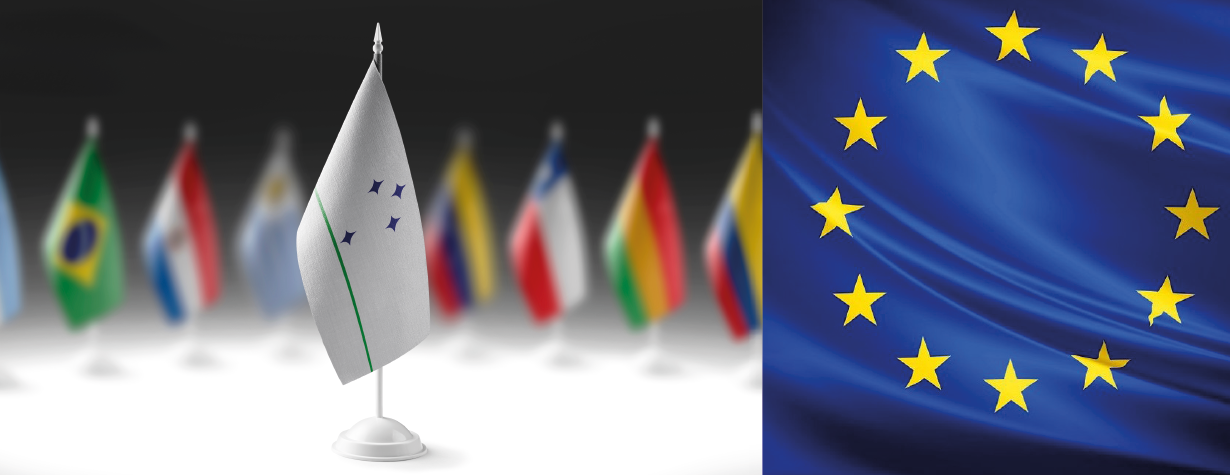Between „Strategic Autonomy” and „Zeitenwende”: The Importance of Trade Between The EU and Mercosur
This policy paper analyses the geopolitical and economic significance of the EU-Mercosur agreement for the European Union (EU) in the context of the EU’s new European Economic Security Strategy.

In view of geopolitical changes and growing protectionist tendencies of large economies such as China and the USA, closer co-operation with the Global South, including the Mercosur countries, is considered necessary. Germany and France have reorganized their trade policies, in particular through a joint industrial strategy and a derisking strategy to reduce economic vulnerabilities, which could represent an opportunity to bring together traditionally different views of trade policy.
The Mercosur agreement offers the EU the opportunity to deepen its economic relations with South America and reduce dependencies on other global trading powers. This could be achieved by opening up European markets for South American agricultural commodities and the export of European industrial goods. The aim is to promote bilateral trade and investment and reduce trade barriers, also in order to position the EU as a serious alternative trading partner to China.
The policy paper concludes that the Mercosur agreement could be an essential building block for the EU’s economic security in a fragmented world, provided that the different national interests within the EU are harmonized and a clear strategy is developed to overcome geopolitical challenges.
- This note was written in partnership with the IW Köln. The German Economic Institute (IW) is a private economic research institute in Germany, which is an advocate of a liberal economic and social order. We work to improve understanding of how business and society function and interact.
Simon Gerards Iglesias, Economist and Economic Historian, The Institut der deutschen Wirtschaft, Cologne.
Marie Krpata, Research Fellow at the Study Committee on Franco-German Relations (Cerfa) at the French Institute of International Relations – Ifri.
Ana Helena Palermo Kuss, Economist and Advisor to the President at ZEW - Leibniz-Zentrum für Europäische Wirtschaftsforschung, Mannheim.
This publication is available in:
German: "Zwischen „strategischer Autonomie” und „Zeitenwende”: Die Bedeutung des Handels zwischen der EU und Mercosur" on the Website of Institut der deutschen Wirtschaft (IW).

Available in:
Themes and regions
Share
Download the full analysis
This page contains only a summary of our work. If you would like to have access to all the information from our research on the subject, you can download the full version in PDF format.
Between „Strategic Autonomy” and „Zeitenwende”: The Importance of Trade Between The EU and Mercosur
Related centers and programs
Discover our other research centers and programsFind out more
Discover all our analysesThe Franco-German Brigade and the Revival of European Defense
One thing has been clear since Donald Trump's return to the White House: the very existence of the European unification project is threatened. Unless it develops a sovereign defense policy to counter the war in Ukraine and the weakening of American security guarantees, the European Union will continue to see its internal cohesion and external attractiveness wane.
Friedrich Merz and the Zeitenwende 2.0. A “New Era” for Transatlantic Relations?
On February 23, 2025, almost 60 million voters were called upon to elect a new Bundestag. These elections will also give rise to a new government in Europe's largest economy.
After the Elections: Germany in Search of Shaken Stability?
With a voter turnout of 82.5%, Germany recorded its highest participation since 1987—an increase of 6.1 percentage points compared to 2021. As in the previous election, the high turnout particularly benefited the Alternative for Germany (AfD), which was able to mobilize many former non-voters. Many voters sought to punish the outgoing government with their ballots, as its approval rating had dropped to just 14% before the coalition broke apart in November 2024. Germany is now very likely heading toward a grand coalition between the CDU/CSU and the SPD, with exploratory talks having begun on February 28.
The German Greens as an Alliance Party: The End of an Illusion?
At the Wiesbaden Congress in November 2024, Robert Habeck, currently Minister for the Economy and Climate, was nominated as the Green Party’s candidate for the Chancellorship in the early parliamentary elections on February 23, 2025. The party, founded 45 years ago, is now firmly established in the German political landscape. Wishing to turn the page on an unloved ‘‘traffic light’’ coalition, the party is banking on a personal campaign and an optimistic discourse based on the energy transition and social justice.












